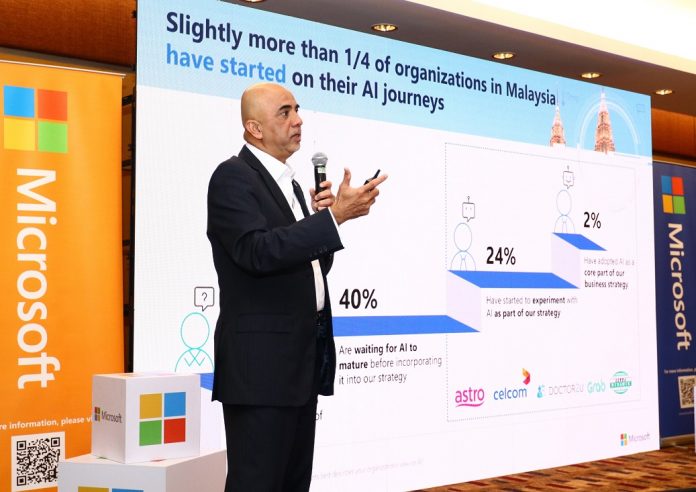Artificial Intelligence to nearly double the rate of innovation in Malaysia by 2021
By 2021, Artificial Intelligence (AI) will allow the rate of innovation to almost double and increase employee productivity improvements by 60% in Malaysia, according to the country’s business leaders. The study from Microsoft and IDC Asia/Pacific, Future Ready Business: Assessing Asia Pacific’s Growth Potential Through AI surveyed 100 business leaders and 100 workers in Malaysia.
While seven in 10 business leaders polled agreed that AI is instrumental for their organization’s competitiveness, only 26% of organizations in Malaysia have embarked on their AI journeys. Those companies that have adopted AI expect it to increase their competitiveness by 2.2 times in 2021.
“Today, every company is a software company, and increasingly, every interaction is digital. To be successful in this new world, organizations need to be a fast adopter of best-in-class technology; and secondly, they need to build their own unique digital capabilities,” said K Raman, Managing Director, Microsoft Malaysia. “AI is the defining technology of our time that significantly accelerates business transformation, enables innovation, boosts employee productivity, and ensures further growth. Economies and businesses that have yet to embark on their AI journey run a real risk of missing out on the competitive benefits that are enjoyed by leaders.”
Why adopt AI?
For the organizations that have implemented AI initiatives, the top five business drivers to adopt the technology were (in priority order): Better customer engagements and higher competitiveness (both tied as the number one driver with 31% respondents respectively); accelerated innovation and improved efficiency (12%); as well as more productive employees (8%).
Jun-Fwu Chin, Research Director for IDC Asia Pacific Datacenter Group said: “Last year, organizations that have adopted AI saw tangible improvements in those areas in the range of 17% to 34%. They forecast further improvements of at least 1.6 times in the three-year horizon, with the biggest jump expected in accelerated innovation, higher competitiveness and better customer engagements.”
Malaysia needs to build on AI culture, as well as the rest of the dimensions
The study evaluated six dimensions critical to ensuring the success of a nation’s AI journey. It uncovered that Malaysia needs to focus on improving on all areas, particularly its data and investments in order to accelerate its AI journey.
“Malaysia is not ready yet for AI. To succeed in AI race, Malaysia needs to substantially improve its readiness. Organizations’ leadership should make AI a core part of their strategy and develop a learning agility culture. They have to continuously invest in this transformative technology for the long-term success, sometimes without immediate returns,” Chin said. “There is an urgent need for talents and tools to develop, deploy and monitor AI models, along with the availability of a robust data estate with the adequate governance.”
Business leaders who are adopting AI face three top challenges a lack of thought leadership and leadership commitment to invest in AI; lack of skills, resources and continuous learning programs and lack of advanced analytics or adequate infrastructure and tools to develop actionable insights.
The study showed that to move ahead on their AI journeys businesses must create the right organizational culture. Majority of business leaders and workers surveyed believe that cultural traits that support AI journeys, such as risk-taking, proactive innovation, as well as cross-function partnerships among teams, are not pervasive today. “Overall, workers in Malaysia are more sceptical than business leaders about the cultural readiness of their organizations,” added Chin.
“Business leaders must now embrace a new culture, where innovation and continuous learning are core components of the organizational culture. It sets the stage for agility, adaptability and growth,” said Raman.
Organizations need to address skills challenge for an AI-enabled workforce
The study found that Malaysia’s business leaders and workers hold positive viewpoints about the AI’s impact on the future of jobs. More than half (67% of business leaders and 64% of workers) believe that AI will either help to do their existing jobs better or reduce repetitive tasks.
“When it comes to creating or replacing jobs, 17% of business leaders believe that AI will create new jobs, while 10% also feel that the technology will replace. Interestingly, workers are more optimistic, with only 7% expecting AI to replace jobs, and 18% to create new ones. At the same time, almost 11% of workers expect no impact to their jobs in three years from now.” said Chin.
The study also found that workers are more willing to reskill than business leaders believe they are. 23% of business leaders felt that workers have no interest to develop new skills, whereas only 10% of workers are not interested.
“Microsoft’s vision for AI is first and foremost about people. AI technology cannot progress without them. This means that millions will need to transform themselves into skilled workers as well as learners that an AI future needs,” said Raman. “It is heartening to see that 82% of businesses prioritize skilling and reskilling of workers in the future. They plan to invest as much, or even more, in human capital than in new technology. Even so, 72% of business leaders have yet to implement plans to help their employees’ to acquire the right skills, which is worrying in today’s context. They must have the urgency to support the fundamental shift in training workers for the future.”
The Microsoft AI study surveyed 1,605 business decision markets, and 1,585 workers from 15 markets participated in it. This included 100 business leaders and 100 workers in Malaysia.





















